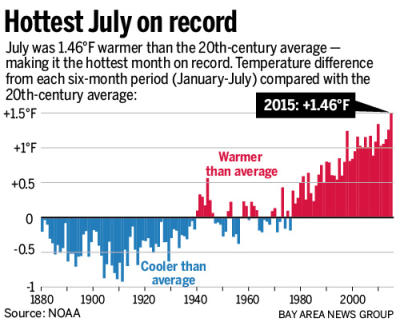July 2016 Hottest Month Ever

Summer is the month when students and teachers alike get to enjoy beaches, dips in the pool, and ice cream of all different flavors. These activities are most common because honestly, it’s so hot that these forms of relief prove to be the best way to battle baking in the unforgiving sun. However, there’s trouble in paradise: July 2016 has been recorded as the hottest month in the history of recorded temperatures.
The National Aeronautics and Space Administration (NASA) and The National Oceanic and Atmospheric Administration (NOAA) gathered this grim information, and July’s record breaking heat isn’t the only problem we have on our environmentally crisis-filled hands. Even though July is normally the hottest month of the year, this July was the 379th month with temperatures at least nominally above the 20th century average. Also, according to Discover Magazine, we are witnessing the longest streak of a 137-year record (Discover).
The last few decades have successfully one up-ed one another in record breaking heat, conditioning citizens to hear such news with less alarm than the last record breaking month or year. Statistics show an alarming trend in the human effect on global warming. Part of the warmth comes from El Nino Southern Oscillation (ENSO), which describes the fluctuations in temperature between the ocean and atmosphere in the east-central Equatorial Pacific. There are La Nina and El Nino, the latter being the warm phase and the former the cold phase.
ENSO granted us with increased global temperatures back in 2015 (0.09°F to 0.18°F). Meanwhile, 1.8°F of 2015’s temperature was found to be from human climate change. This means 10 percent of the increased climate change can be chalked up to El Nino and the remaining 90 percent comes from human induced climate change. Climate Nexus, which describes itself as a “strategic communications group dedicated to changing the conversation on climate and clean energy solutions in the United States,” takes the position that the Earth’s population has to take responsibility for the damage its doing to the Earth.
Sweltering heat acknowledged, we’ve lost 40 percent of our polar ice caps in the past 30 years. Also, countries across the globe have seen a degree hike in average heat waves. This includes Australia, Hong Kong, and the United Kingdom. Furthermore, carbon dioxide emissions are at an all-time high: passing 400 parts per million this May, according to CNN. This is completely destroying ice in the northern hemisphere, giving scientists an idea of how urgent our climate issue is becoming.
Eco Watch says that our oceans will rise between 2.5 and 6.5 feet (0.8 and 2 meters) by 2100, submerging the entire east Coast of the United States. Of course, this is if these warm trends continue. Taken previous records and a reluctance by some in power to accept the science of climate change into consideration, thet most assuredly will.








